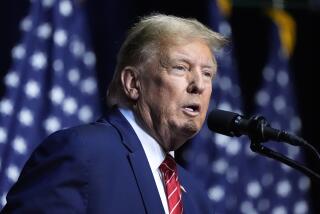Donald Trump hasn’t switched to a general-election game yet, and that’s risky

By now, most candidates in Donald Trump’s position would have begun looking ahead to November, modulating their tone and emphasizing positions that could broaden their appeal ahead of the general election.
Trump, of course, is no ordinary politician.
That has been perhaps his greatest strength as he moves closer to nabbing the Republican presidential nomination. Now, though, it may become a problem.
Over and over, despite the concerns expressed by Republican leaders, Trump has offered scant accommodation to anyone put off by his shock-jock-radio style, which thrills supporters but offends many others.
That take-or-leave-it approach was on display again as he campaigned ahead of Tuesday’s Republican contests in Arizona and Utah.
After a six-week truce, he randomly renewed his attacks on Fox News anchor Megyn Kelly, calling her sick and crazy. When violence broke out Saturday in Tucson at yet another Trump rally, his reaction to the televised beating of a heckler was to praise the attacker and criticize protesters and the media.
All the while, the main TV ad that Trump aired in Phoenix promoted his call for a temporary ban on Muslims entering the United States and showed scores of Latinos swarming across what looks like the U.S. border with Mexico, underlining positions that have antagonized members of both parties.
“Obviously he believes this is working, because at this point he’s got more delegates than anybody else,” said David Winston, a pollster for Republican leaders of the House and Senate and no fan of the billionaire.
But Trump, who has never won a majority in any state, can be competitive in November only if he draws support beyond the aggrieved, mostly white male voters who drove his victories in 19 contests and made him the overwhelming GOP front-runner. Women and Latino voters, in particular, are two key constituencies in the general election that Trump has badly alienated.
“When you take a look at national surveys, he’s trailing Hillary Clinton by a pretty significant margin,” Winston said. “So he better start thinking through what a general election is going to look like and how he begins to address that if he’s going to be the nominee.”
It’s never been Trump’s way to dial back his rhetoric. Rather, his first instinct when criticized is to dig in, and his success — few expected him to be in the commanding political position he enjoys today — has only reinforced that inclination.
In Phoenix and Tucson on Saturday, he campaigned with two of the nation’s best-known hard-liners on illegal immigration: former Gov. Jan Brewer and Maricopa County Sheriff Joe Arpaio. Few politicians are as widely loathed by Latino voters.
Mike Madrid, a California Republican strategist who has spent decades working to build Latino support for the GOP, said Trump’s image may be too firmly fixed, especially in the Latino community, to change at this point.
“He might say, ‘We’ll take 10 feet off the wall but still have Mexico pay for it,’ and maybe that would work,” Madrid said, though he doubted it. “The die is pretty much cast…. It’s not something that switches from the primaries to the general election.”
Amid his unmatched string of victories, there have been warning signs, which Trump so far has chosen to ignore.
Throughout the primary season, exit poll interviews showed that late deciders tend to favor his opponents. That suggests that over time Trumps antics haven’t worn so well.
Also worrisome for Trump, nearly 3 in 10 Republicans who cast ballots in five primary contests last week said they would not vote for him if he won the GOP nomination; two of those states, Ohio and Florida, will be major fall battlegrounds.
Separately, 4 in 10 Republicans surveyed said that in a contest between Trump and Democrat Hillary Clinton, they would consider voting for a third-party candidate rather than their party’s nominee.
For now, Trump is still facing GOP rivals Ted Cruz and John Kasich, along with a blast of attack advertising by major Republican donors trying to block him from securing a majority of delegates before the party’s July convention in Cleveland.
Trump annoyed the party’s top elected officials last week by saying riots could break out if he’s denied the nomination after winning more delegates than any other candidate.
“Nobody should say such things in my opinion, because to even address or hint at violence is unacceptable,” House Speaker Paul D. Ryan told reporters in Washington.
On Monday, Trump mingled with members of the GOP establishment at a party meeting in Washington, which included some Republican members of Congress as well as former House Speaker Newt Gingrich and Jim DeMint, president of the Heritage Foundation.
Characteristically, he suggested the party needed to move in his direction, not the other way around.
“If people want to be smart, they should embrace this movement,” Trump said. “If they don’t want to be smart, they should do what they’re doing now, and the Republicans can go down to a massive loss.”
Twitter: @finneganLAT
Twitter @markzbarabak
Finnegan reported from Phoenix and Barabak from San Francisco. Times staff writer Joseph Tanfani in Washington contributed to this report.
More to Read
Get the L.A. Times Politics newsletter
Deeply reported insights into legislation, politics and policy from Sacramento, Washington and beyond. In your inbox three times per week.
You may occasionally receive promotional content from the Los Angeles Times.








